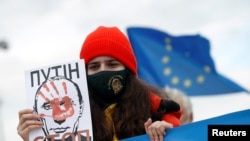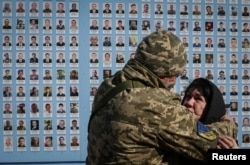On March 14, Russian President Vladimir Putin visited the Republic of Buryatia, a Russian region of less than a million people, most of them members of the Buryat ethnic minority.
Buryatia reportedly sends a disproportionately high number of residents to fight in Ukraine and has suffered the highest casualty rates.
According to the Kremlin, workers at the Ulan-Ude Aviation Plant in Buryatia’s capital, Ulan-Ude, asked Putin how they could help “win the war and bring peace.” In answering, Putin repeated the false pretexts he cited when announcing the full-scale invasion a year ago:
“For us, this is primarily about fighting for our people who live in these territories. This is the Russian world after all. They are one of us, part of our nation. How can we leave them behind?”
He went further, claiming that Ukraine’s entire population is “Russian-speaking”: “We relied not just on the Russian-speaking population there [in Ukraine] – the whole country is Russian-speaking, as a matter of fact.”
That is false.
History matters: In all of the countries that were formerly part of the Soviet Union, including Ukraine, Russian remains one of the main languages, because it was the Soviet Union’s state language.
Still, in Ukraine, native Russian speakers are a minority. According to surveys, 34% to 47% of Ukraine’s population use only Russian in everyday life or use it along with Ukrainian.
The Sociological Group “Rating” (Rating Group), which describes itself as “one of the biggest” non-governmental and independent research organizations in Ukraine, has conducted comprehensive studies of language use in Ukraine since 2012.
According to the group, over the past 10 years, the number of Ukrainians who said they spoke only Russian at home peaked at 38% in February 2014. Those who said they spoke both Russian and Ukrainian at home peaked at 58% in July 2012.
The number of those who speak only Russian decreased from 37% in July 2012 to 13% in August 2022.
In the latest Rating Group survey, conducted in August 2022, 76% indicated that Ukrainian was their native language, while 19% indicated that Russian was their native language:
“The share of those who speak Ukrainian at home continues to grow. Specifically, today, 51% say they speak Ukrainian at home (48% said so in April 2022), while a third of the respondents speak both languages, and 13% speak Russian.”
The largest share of Ukrainians who speak Russian live in southeastern Ukraine:
“More than half of the residents of the South and East of Ukraine are bilingual, about a quarter are Russian-speaking. In western Ukraine, only 2% speak Russian at home, while 9% speak Russian and Ukrainian.”
Russia’s February 2022 invasion of Ukraine increased the use of the Ukrainian language in the country. Before the war, 54% of the Ukrainians always spoke Ukrainian, 26% - sometimes, and 19% - rarely or never. The number of those who speak Ukrainian regularly increased to 64%, while 24% speak Ukrainian sometimes and 12% do so rarely or never.
Many Russian-speaking refugees evacuated from the areas occupied by Russia took Ukrainian language courses in those cities of Ukraine where they relocated.
In an interview with Current Time, a television channel produced by Radio Free Europe/Radio Liberty in cooperation with the Voice of America, Valentina Masiyash, a Ukrainian language teacher and refugee from Ukraine’s Zaporizhzhia region, said Russia uses the Russian language as a weapon against Ukraine’s independence, and many Ukrainians see it as their patriotic duty not to speak Russian:
“The enemy was ready to Russify Ukraine and prove that Ukraine does not exist. That it is just a part of Russia.”
The results of a December 2022 survey conducted by the Kyiv International Institute of Sociology (KIIS), a private Ukrainian research center, found that 15% of Ukrainians communicated at home, with their families, mainly or only in Russian, while 19% spoke Ukrainian and Russian equally. "That was a significant change from 2017, when 25% spoke only or predominantly Russian at home and 24% spoke both languages equally," KIIS noted.
Six percent of respondents told KIIS they speak only Russian, 9% said they speak predominantly Russian, and another 24% said they speak Ukrainian and Russian "equally." Compared to 2017, the share of Ukrainian speakers increased by 8%, while the share of Russian speakers decreased by 11%. Even in eastern and southern Ukraine, 29% speak Ukrainian, while 27% speak Russian.
A survey conducted jointly in December 2022 by two Ukrainian think tanks, the Ilko Kucheriv Democratic Initiatives Foundation and the Razumkov Center, found that only 9.9% of Ukrainians considered Russian their native language, while 23.2% said they spoke only Russian at home – down from 32.6% in December 2021.






